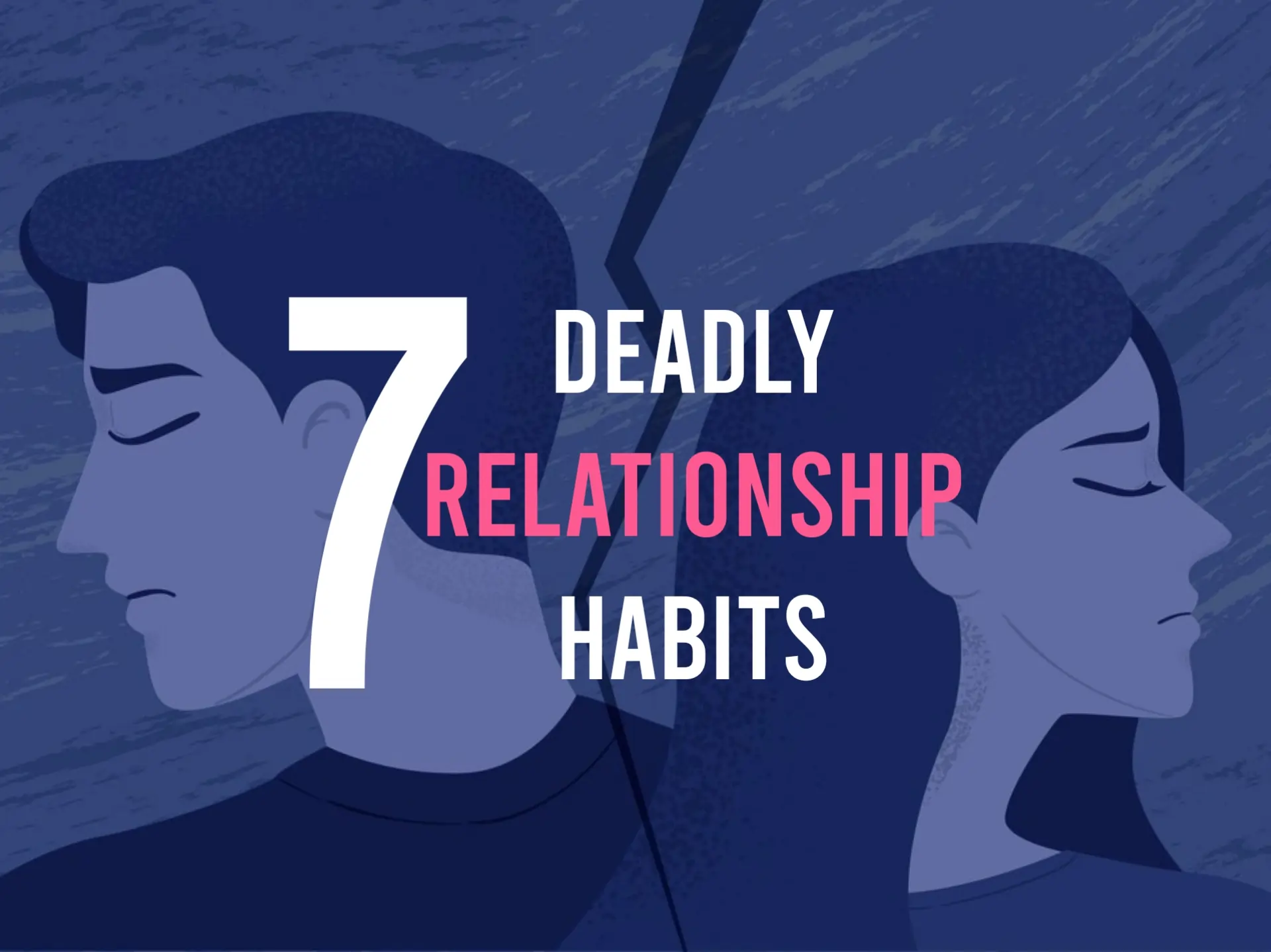7 Deadly Relationship Habits That Ruin Your Love Life

How many of you have ever been involved with a significant other who wanted you to do something you didn’t want to do? I doubt that I’m the only one.
By virtue of a significant other relationship, there will be times when our partners will want us to do things we don’t necessarily want to do. Conversely, there will be times when we will want our partners to do things they don’t want to do.
This is perfectly normal. The key, however, is what we do about it.
Can you remember the behaviors your partners used to get you to do things their way? Dr. William Glasser, in his book Getting Together and Staying Together, talks about the seven destructive relationship habits. They are: complaining, criticizing, blaming, nagging, threatening, punishing, and bribing or rewarding to control.
The 7 Destructive Relationship Habits
- Complaining
Complaining about what your partner does or doesn’t do is a common habit, but it can quickly undermine a relationship. It’s easy to fall into the trap of thinking that if you just point out what bothers you enough, they’ll change. - Criticizing
Criticism targets the person instead of the behavior. Saying things like, “Why can’t you ever do anything right?” or “You’re so irresponsible” erodes your partner’s sense of self-worth and damages the relationship. - Blaming
Blame shifts responsibility for problems onto your partner, making them feel attacked or inadequate. Statements like, “It’s all your fault” or “You never listen” put the other person on the defensive and halt productive communication. - Nagging
Nagging is repetitive and often builds resentment. When you repeatedly ask your partner to do something, it can create feelings of frustration and avoidance rather than cooperation. - Threatening
Threatening your partner with consequences like, “If you don’t do this, I’m leaving,” escalates tension and drives a wedge in the relationship. This tactic is used to exert control but often backfires, creating distance instead. - Punishing
Punishing involves withdrawing affection, giving the silent treatment, or otherwise making your partner suffer when they don’t comply with your wishes. This habit erodes trust and emotional safety. - Bribing or Rewarding to Control
This tactic is more subtle but still harmful. Offering rewards to manipulate behavior, like saying, “If you do this for me, I’ll make it worth your while,” creates a transactional dynamic rather than fostering mutual respect and understanding.
Do you recognize any favorites? If we’re honest with ourselves, we can probably identify at least a few times when we’ve resorted to one or more of these behaviors to get our partners or loved ones to act in a way that suited us. These behaviors are not uncommon in relationships because we all have needs and desires, but it’s the manner in which we try to get those needs met that can either strengthen or strain the relationship.
I’d like to add guilting to the list—this seems to be a favorite behavior of mothers. I know, because I am one. You can recognize this pattern in martyr-type behavior.
Saying things like, “After all I’ve done for you, you can’t do this one little thing for me?” This is classic guilt-tripping. It subtly places blame on the other person for not fulfilling an obligation they might not even have agreed to in the first place. It can leave the person on the receiving end feeling trapped, as if they owe you something, which is never a healthy foundation for any relationship.
I’ve actually heard some mothers play the “childbirth card”. You know the one. It sounds like this:
“I was in labor with you for 36 hours! All I’m asking for is this one thing.”
These types of guilt trips may work in the short term, but they ultimately sow resentment. Over time, the person being guilted may start to distance themselves emotionally, feeling as though their worth in the relationship is tied to their compliance with demands.
I know for me, I am a world-class nagger—just ask my children. The question of “Will you clean up your room today?” can be asked in a variety of ways, with different tones and volumes. But each version of the question, though phrased differently, ultimately boils down to one thing: an attempt to exert control over another person’s behavior.
By the time I’ve reached the end of my rope, it often sounds like: “How can you be so lazy! If you don’t do it right now, I am going to do something to hurt you!” (This pain usually took the form of haranguing my child for an extended period of time.) Does this sound familiar?
With regard to nagging, it is my belief that after you’ve said it three times, your significant other has probably heard you and is not planning on obliging you any time in the near future. Repeating your request is unlikely to succeed.
Complaining and Criticizing
Complaining and criticizing are other behaviors we often engage in to get our loved ones to do something they don’t want to do.
Does this sound familiar?
“Why can’t you be more like __?”
“Do you have to do it THAT way?”
“Why can’t you ever do something I want?”
These types of criticisms can tear at the fabric of a relationship, leaving the criticized partner feeling devalued. Over time, it can wear away their self-esteem and emotional resilience. This is the opposite of relationship-building behavior.
Blaming, Threatening, and Punishing
Blaming sounds like: “It’s always your fault.”
Threatening goes like this:
“If you do or don’t do __, then I’m going to (insert something you won’t like).”
Punishing often takes the form of withdrawal. It may be that we give our partners the silent treatment or withdraw affection. None of these behaviors lead to healthy, lasting relationships.
Bribing vs. Negotiation
The last destructive habit to discuss is called bribing or rewarding to control. Bribing does not mean the same thing as negotiation.
Negotiation in a relationship is healthy. It involves two willing partners, each interested in helping the other person get what they need while meeting their own needs.
Bribing, however, simply means that I am going to dangle a carrot of what I think you want in front of you to get you to do the thing I know you don’t want to do.
Here’s an example:
I asked my youngest son to clean his room. His room was a mess. I said, “If you clean your room today, I’ll let you have a friend over.” Do you know what he said?
“I don’t want a friend that bad.”
And the room didn’t get cleaned.
Bribing or rewarding to control is a far cry from true negotiation, which requires the involvement and willingness of both parties. While bribing may occasionally work in the short term, it doesn’t build a relationship that stands on mutual respect and understanding.
The Bottom Line
We often engage in destructive relationship patterns with those people we claim to love the most. Why do we reserve our worst behaviors for the people we care about? Typically, we don’t use these destructive behaviors with our friends because, if we did, we wouldn’t have any friends left!
When we think about progress over the past 100 years in terms of technology and relationships, it is clear we have made great strides in technology and minimal gains, if any, in our relationships with each other.
Can you think of things we have today that didn’t exist 100 years ago?
Today we have cell phones, computers, satellites, televisions, DVDs, space travel, etc. The list is endless.
One of the reasons for our technological advances is that we are willing to try new approaches when old ones no longer work. In relationships, however, people often cling to the same failed behaviors.
When external control behaviors don’t work, we often double down, convinced that doing it more often, harder, or louder will finally make a difference. But it rarely does.
There Are Alternatives
The first step is to recognize when we are using external control behavior. Awareness is key.
It’s easy to beat ourselves up for falling into these habits, but the truth is, recognizing them is the first step toward change. Once we become aware of these behaviors, we can consciously decide to replace them with more caring habits.
Remember, the goal is to honor both ourselves and our partners. When we can do this, we create a space for healthier, more fulfilling relationships.
Let go of control and embrace connection.


![Stage Academy: Master Your Communication Skills [ Free Down]](https://readerboot.com/wp-content/uploads/2025/05/tcWy6bUOT1OZ5UVtM9WY_Screen_Shot_2022-10-08_at_9.32.56_pm-884x768.png)



